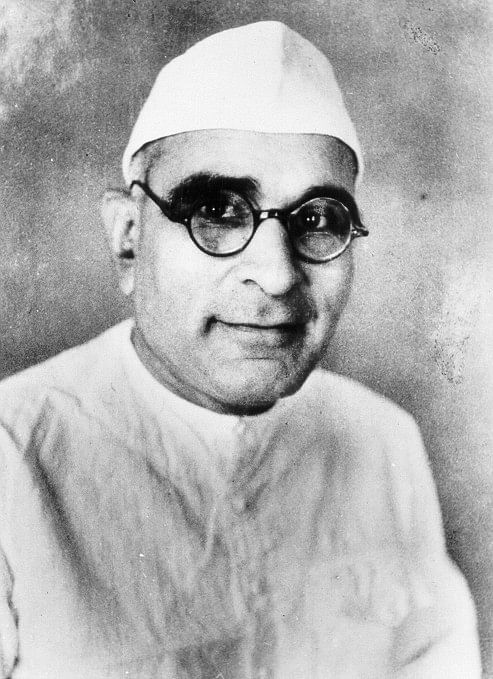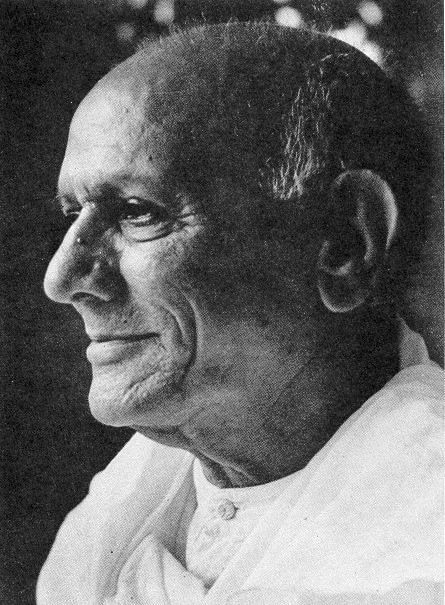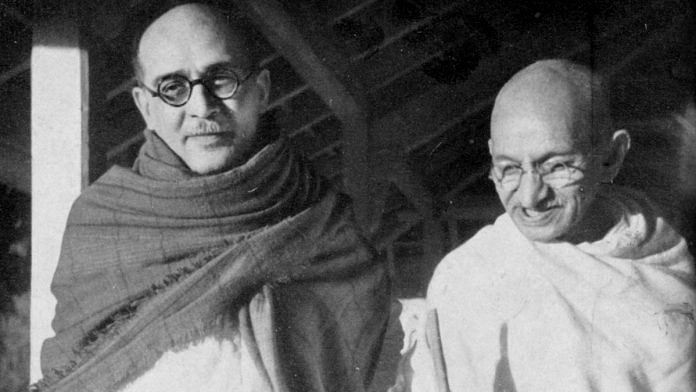Daily documentation on Mahatma Gandhi’s movement owes much to Mahadev Desai, Narhari Parikh and Swami Anand.
Mahatma Gandhi had a way with words. He was considered a rare leader who meant what he said or wrote. That made the job of his secretary all the more difficult. And Mahadev Desai (1892-1942) was perfectly suited for the role.
But he was not just a secretary. He was ‘Boswell’, ‘Ganesh’, ‘Hamaal’ (porter), emissary and ‘Peer-Babarchi-Bheeshti-Khar’ (पीर-बबर्ची-भिश्ती-खर/guide-cook-waterman-someone who carries the load) for Gandhi.
Desai studied law and was a man of letters. He translated Rabindranath Tagore’s Chitrangada and John Morley’s On Compromise into Gujarati before meeting Gandhi. He was associated with the Home Rule League like many young men of his times. But meeting Gandhi changed course of his life, and to an extent, that of Gandhi’s too.
Desai almost worshipped Gandhi and dedicated his life to the Bapu and the ashram. He not only kept rich, detailed notes, but also internalised Gandhi’s philosophy. On several occasions, Gandhi would only change initials from MD to MKG in Desai’s articles. He was a major contributor to Gandhi’s papers.
Also read: Aruna Asaf Ali, a fiercely independent freedom fighter who defied Mahatma Gandhi
Apart from Gujarati, Hindi and English languages, Mahadev also knew Marathi and Bengali. Many envied his speed and handwriting, but he had to bear the brunt of Gandhi’s uncompromising nature many a times. He was also one of those select few whom Gandhi trusted infinitely.
In fact, Gandhi and Sardar Patel both thought only Desai could do justice to their biography. He translated Gandhi’s autobiography and his The Gita according to Gandhi into English and Jawaharlal Nehru’s autobiography into Gujarati among several others.
Desai was jailed with Gandhi and Kasturba at Aga Khan prison in 1942 where he died of heart failure. Gandhi, a father figure to him throughout his life, performed his last rites like a son.
Desai had travelled extensively with Gandhi, and maintained hostile schedules and wrote diaries from 1917 to 1942 in long hand. Editing and publication of Desai’s diaries began soon after Gandhi’s assassination in January 1948. They are a rich source of first-hand information and detailed descriptions of Gandhi’s working and thinking process.
Also read: Mahatma Gandhi’s little-known love affair with a married, progressive woman in Lahore
The first editor of Desai’s diary was his long-time friend and Gandhi associate Narhari Parikh (1891-1957). They studied law together in Mumbai. Both met Gandhi together at Ahmedabad in 1915 when they were trying to establish their practice. Parikh joined the ashram in 1916, followed by Desai in 1917.

Parikh took part in the Bardoli Satyagraha, bore the brunt of the police lathis during the famous raid on Dharasana Salt Works and went to jail. He was appointed registrar of Gujarat Vidyapith and later on Gandhi entrusted him with the responsibilities of the Harijan Ashram. After Desai’s death, he worked as Gandhi’s secretary for some time. He edited Desai’s diaries and brought out six volumes. He was also Patel’s second choice for writing his two-part biography, after Desai died.
Parikh wrote a book on the economics of khadi and compiled a biography of veteran Gandhian philosopher Kishorlal Mashruwala. These works form an important part of understanding Gandhi’s period and his legacy.
Like the Desai-Parikh duo, Gandhi had another pair of friends at his service: Dattatreya (Kaka) Kalelkar and Swami Anand. Kaka, a Maharashtrian by birth, earned the nickname ‘Savai Gujarati’ (More Gujarati than the Gujaratis) due to his command over the language. Swami Anand, by contrast, was born Gujarati but had complete command over Marathi as well as Gujarati. He wrote in Gandhi’s Gujarati weekly Navjivan but also ably managed to turn around its fortunes.

Born as Himmatlal Dave, Swami Anandnand (1887-1976) was a monk in the Ramakrishna Paramhansa tradition. After wandering in the Himalayas in search of eternal truth in vain, he returned to serve the nation and, like Kaka, became a follower of Tilak. Then, Gandhi’s arrival and his novel, spiritual yet concrete approach towards politics attracted many believers. Swami was one of them. It was on Swami Anand’s insistence that Gandhi began serialising chapters of his autobiography for Navjivan.
Also read: What would have happened to Mahatma Gandhi in the times of Cambridge Analytica and Facebook?
Sardar Patel appreciated his role so much that he invited Swami to Delhi after a decade when the former became deputy Prime Minister. Swami refused politely and kept a distance from politics. Disturbed by communal strife and Gandhi’s assassination, he spent few years in relief work and rest of his life at few places like Kausani. During this period, he rose to become an eminent Gujarati writer of the 20th century with his unique style and generous use of colloquial words.
Swami Anand, Narhari Parikh and Mahadev Desai, all soldiers of Gandhi, enriched the Gandhian literature.
Urvish Kothari is a senior columnist and writer in Ahmedabad.
(Gandhi’s Gujarati comrades: On the occasion of 150th birth anniversary of Mahatma Gandhi, ThePrint brings you a three-part series on his forgotten colleagues from Gujarat. Read the second part, third part here)




If one knows that Gandhi was a socialist fool that’s more than enough.